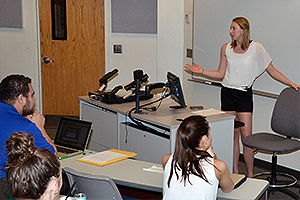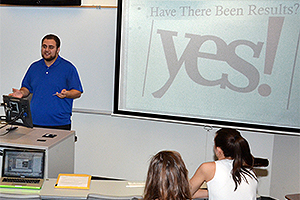Students at the University of Nebraska
–Lincoln College of Business Administration in the ECON 445 Economics, Gender and Social Provisioning class presented ideas for making a positive impact in the world during finals week. Their assignment was to deliver a five minute presentation, similar to a TED Talk, a national series of presentations given under the broad umbrella of “ideas worth spreading,” on a subject related to the class. The result was a diverse series of presentations ranging from turning used pizza boxes into firewood to helping increase the minimum wage in Bangladesh.
Dr. Ann Mari May, professor of economics, taught the class and believes it is vital students not only learn the material in class but also be able to apply it to real-world problems.
“We all need to have the ability to offer what some call ‘an elevator speech,’ clearly articulating our solution to an important problem,” May said. “The exercise was not only inspiring, but good practice at making a case in a short amount of time to an important client or policy-maker.”

Juffer explains sustainable wage solutions
Jacqueline Juffer, a sophomore economics and political science major from Wagner, South Dakota, was one of the students who presented her ideas for change.
“I looked at U.S. companies who have a competitive advantage when it comes to producing garments made by workers outside of our country,” Juffer said. “The companies often pay workers an amount which is not a sustainable living wage.”
Her presentation outlined how the minimum wage in Bangladesh is $14 a month when a sustainable wage is closer to $92 per month. Her solution involved more stringent reporting standards for U.S. companies so the public can make better informed decisions when purchasing.
“I’d like to see the Security and Exchange Commission (SEC) require companies to report the number of hours their employees and subcontracted employees are working, along with the total number of employees and wages so we have a clearer picture of how companies are making profits,” she said. “The solution can be achieved through increased oversight and incremental wages.”

Fox promotes uniting consumers to create change
Gabe Fox, a senior economics and political science major from Omaha, Nebraska, also looked at fair labor practices by outlining an opportunity for UNL students to buy clothing from Alta Garcia – a company that focuses on using workers from the Dominican Republic who are paid a living wage.
“Right now there is one rack of clothing at the Nebraska Bookstore made by Alta Garcia,” Fox explained. “If students are made aware of how Alta Garcia treats their workers, they may choose to buy their clothing and that number could grow.”
Fox emphasized that beyond the low wages, poor working conditions are also a problem in the factories.
“The labor practices often increase illiteracy by denying educational opportunities,” he said.
He believes his solution to unite consumers through awareness campaigns has already made a difference.
“We’ve already seen progress in how workers are treated in countries like China where companies have listened to the public when they have flexed their consumer muscle.”
Published: May 14, 2014